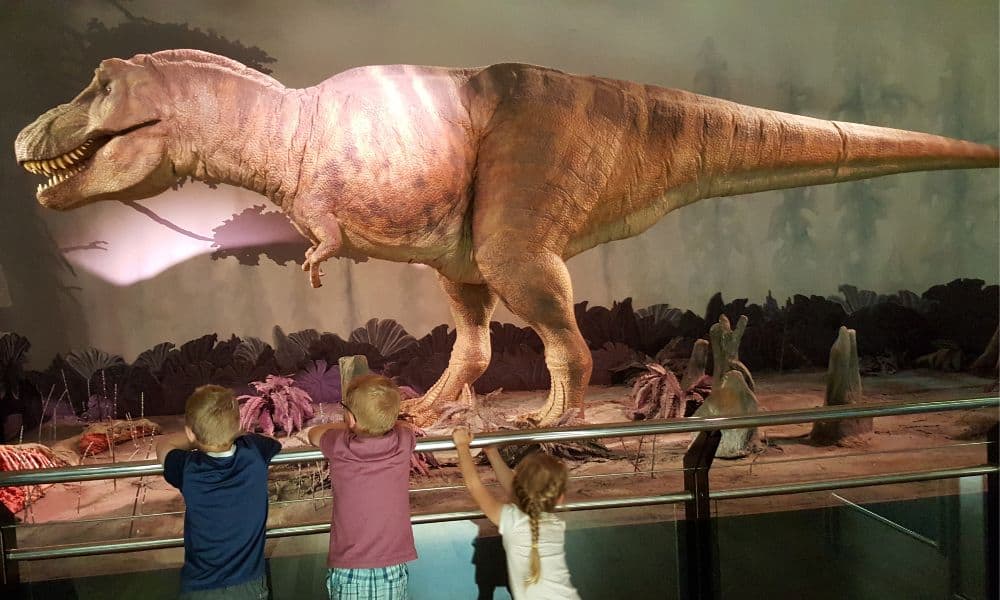The Best Age To Travel With Kids – Infants, Teens Or NOW!
Deciding on when the best age to travel with kids is can be more complicated than selecting which destinations to explore. You can come up with 101 reasons why now is not the best age to travel with kids, and instead, try waiting for the perfect age.
Is There Ever A Perfect Time To Travel With Kids?
No magic formula, parenting book, or blog will tell you when the best age is to travel with kids. But having travelled extensively with our three children for most of the last two decades, we know that the right time depends on many factors.
These include your intended destination, your children’s personalities, and your family’s preferences, and that’s just for starters!
Trekking The Dream! contains affiliate links and is a member of the Amazon Services LLC Associates Program. If you make a purchase using one of these links, we may receive a commission. This is at no extra cost to you and helps us to keep our site up and running! Read our privacy policy for more information.
Planning A Trip? Use Our Favourite Travel Resources
Flights – We recommend Kiwi.com
Accommodation – We recommend Booking.com
Tour & Activities – We recommend Viator & Get Your Guide
The Best Age To Travel With Kids
Ultimately, the best time to travel with kids is when you feel your family is ready. Embarking on adventures together can work, no matter the age of your children. We put off a family gap year for 10 years, waiting for the perfect time!
Yet despite this, there can be some restrictions when travelling with children. These are often age and ability-dependent, ranging from fewer activity choices to accommodating time-consuming nappy changes, feeding and even sleep.
But there are also certain advantages to travelling with children. Aside from the joy travelling can bring, children who travel will likely gain greater insight into the world, and experience increased family bonding than those who don’t.
Now could be the best time to travel, regardless of your children’s age. Whether you want to travel full-time, for an extreme day trip, a long weekend, or several weeks, is there really going to be a better time to travel with your kids than now?

Travel With Infants (0-12 months)
Many families feel travelling with infants can be a rewarding experience. Infancy is a unique window of opportunity when maternity/paternity leave allows for travel with highly adaptable and portable babies. Unlike older children, infants are not bound by school schedules or extracurricular activities, allowing families greater flexibility in their travel plans.
Most importantly, travelling with infants strengthens family bonds during this precious stage of their child’s development. Infants are often fascinated by new sights, sounds, and sensations, making travel an enriching sensory experience.
Surprisingly, travelling with babies can be a relatively stress-free experience, as they typically require fewer entertainment and activity options than older children. Although meeting their frequent needs, such as feeds, changes, and naps, can be challenging in unfamiliar surroundings.
One big plus is that attractions, hotels and even flights are often free when travelling with infants, making it the cheapest time to travel – trust us, we now travel with teens!

Travel With Toddlers (1-3 years)
Toddlers are a favourite stage because they are curious and energetic. This makes travel exciting as they experience new sights and sounds. This, in turn, can make even simple outings feel like grand adventures compared to other ages.
Additionally, toddlers are still easy to move around, making navigating airports, hotels, and tourist attractions easier.
However, unpredictable tantrums, disrupted routines, the need for constant supervision, and limited attention spans can be potential challenges. Planning ahead, incorporating flexibility into itineraries, and prioritising activities to suit toddlers can mitigate these challenges and ensure a more enjoyable travel experience for everyone involved.
Ultimately, family trips during this stage can help lay the foundation for future adventures and increase family bonding.

Travel With Preschoolers (3-5 years)
With more independence, preschoolers can be particularly fun to travel with. However, they still require supervision and support to participate in most activities.
We travelled a lot with our kids in this age group as they are very flexible in adapting to new environments. Their curiosity and interest enrich simple experiences, like exploring a new city, visiting a museum, or even just going to a park.
Travelling with preschoolers provides opportunities for early exposure to diverse cultures, languages, and landscapes, fostering a sense of curiosity and open-mindedness from an early age.
Potential challenges include managing tantrums and limited attention spans. Despite these minor hurdles, travelling with preschoolers offers precious memories and lays a strong foundation for a lifetime of adventurous spirit and wanderlust.

Travel With Children (6-10 years)
School-age children can significantly benefit from travel, as they are more likely to remember and appreciate the experiences than younger children.
Interruption to schooling is a significant concern at this age, but travelling can be a more rewarding experience for children. Families can participate in educational activities and cultural experiences, making travel a valuable learning opportunity.
Children bring a fresh perspective to travel, often seeing the world with curiosity and wonder, which can enhance the overall experience for everyone involved.
Exposing children to different cultures, landscapes, and experiences at a young age can foster a love for exploration and instil valuable life lessons. Challenges such as long journeys and unfamiliar environments can be too much for some kids. These can be minimalised with careful planning, flexibility, and patience.
As with all ages, the benefits of travelling with family often outweigh the drawbacks, such as the high costs of travelling during school holidays.

Travel With Tweens (11-12 Years)
Travelling with tweens can provide the ultimate family adventure. Families can engage in individual interests, dig deeper into cultural exploration, and everyone can participate in most activities. This age also presents an opportunity to travel for an extended period without disrupting school, extracurricular activities, or friends.
Tweens are more independent and curious, enhancing your family’s travel experience. They will also remember the destinations you visit while being open-minded to new experiences and cultures. Unlike some teens, tweens generally enjoy spending time together as a family.
Travelling allows tweens to develop life skills such as problem-solving, communication, and adaptability. To avoid resistance and resentment, it is essential to consider their specific preferences and interests when planning destinations and activities.

Travel With Teenagers (13+ years)
Travelling with teens presents a unique opportunity for families to bond, explore new horizons, and create lasting memories before adulthood. During this stage, teens are most independent and capable of participating in planning and decision-making, fostering a sense of responsibility and empowerment.
Teens can offer fresh perspectives and insights, enriching the travel experience for the whole family. However, potential conflicts and mood swings typical of adolescence can escalate while travelling. For us, this occurred due to confined spaces, causing eruptions between siblings.
Teen travelling allows families to embark on more adventurous and immersive journeys. Activities and destinations can cater to the interests and curiosities of older children. Additionally, balancing individual preferences and finding activities that appeal to everyone can be more complex.
Despite teenagers being the most expensive age to travel as a family, it might also be the most fulfilling. We are certainly enjoying t

Why Is Family Travel Worth It At Any Age?
Family travel is worthwhile at any age and offers lifelong benefits. Whether children are infants, toddlers, school-age children, tweens, or teens, the shared experience of exploring new destinations strengthens bonds and creates cherished memories that last a lifetime.
For young children, travel stimulates curiosity and broadens their understanding of the world, laying a foundation for lifelong learning and cultural appreciation. As kids grow older, family travel provides opportunities for meaningful conversations, shared adventures, and discovery, strengthening connections and building trust.
But it’s not all about children; family travel exposes the whole family to diverse cultures, landscapes, and experiences that cultivate empathy, resilience, and adaptability, essential for navigating an increasingly interconnected world.
Family travel also allows the whole family to escape daily routines, reconnect with loved ones, and create a sense of belonging. Whether it’s exploring a local park, embarking on a road trip, or jetting off to a distant land, the value of family travel transcends age, enriching lives and shaping future generations with a sense of wonder, curiosity, and belonging.
We have travelled with our kids from babies to teens and have found all of our family travels worthwhile, with memories shared often.
FAQ’s: The Best Age To Travel With Kids
There is no reason to wait until a particular age to travel with children over long or short distances. When planning trips, consider travel durations and time zone changes. Break up long journeys with frequent stops, snacks, and entertainment to make the experience more comfortable.
There isn’t one best age for all families to travel. Generally, once parents feel ready to travel, children of any age will adapt to new situations and environments. Younger children may enjoy simple trips, while older children can engage in more complex activities, so the best time to travel will depend on family preference.
Prioritise safety by being selective of your destination and aware of specific health and safety guidelines for the particular area. Use safety measures that are familiar to you at home, such as seat belts and helmets. Closely supervise children in unfamiliar environments, especially near water. Teach kids about stranger danger and establish a meeting point in case of separation.
Travelling with kids at various ages provides unique opportunities for family bonding, cultural immersion, and educational experiences. Young children view the world with wonder and curiosity, while older kids can engage in more in-depth discussions and activities.
Final Thoughts | The Best Age To Travel With Kids
Ultimately, there is no set age that is better than any other. Travel fosters resilience, adaptability, and appreciation for change in children of all ages. Therefore, the best age to travel with kids will depend on your family’s circumstances and preferences, but now is as good a time as any.
Some families find travelling with infants most enjoyable, while others prefer to wait until their children are teenagers when they are more independent and will remember it. When deciding the best age to embark on family adventures, it’s essential to consider your family’s needs, interests, and comfort levels.
Personally, we have loved travelling with our children at every age. The younger years were the most challenging for us, whereas tweens and teens are the perfect (but most expensive!) age.
